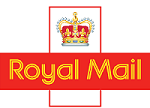

On this Page
A form of postal service has been around ever since humans learnt to write but in the UK the Royal Mail was established in 1516 by King Henry VIII. It went through turbulent conspiritorial times until the restoration of the monarchy in 1660 when King Charles II established a General Post Office.
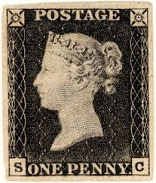
Recipients paid for delivery but it was subject to extensive development and became too expensive for most. In December 1839 the first substantial reform started when postage rates were revised by the short-lived Fourpenny Post. Even greater changes took place when the Penny Post was introduced on 10 January 1840 whereby a single rate for delivery anywhere in Great Britain and Ireland was pre-paid by the sender. A few months later, to certify that postage had been paid on a letter, the sender could affix the first adhesive postage stamp, the Penny Black that was available for use from 6 May the same year.
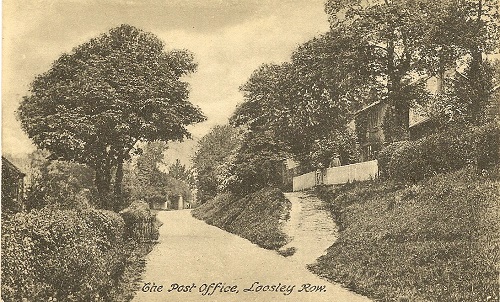
Jesse Ward of Lower Road, Loosley Row was appointed Postmaster around this time. He was born in Speen in about 1800. He married Ruth Eggleton in 1827. They had 4 children, Albert born 1827, Jabez 1832, Mary Ann 1834 and John 1839.
All their sons became carpenters, a skill for which the Ward family was renowned. The Wards of Speen were particularly famed for building large farm barns.
Along with his grocers shop Jesse had a carpenter's shop where Jesse and son Albert made coffins besides general joinery.
Alfred Ward followed in his father's footsteps. He married Elizabeth Steel, daughter of the miller, in 1874. They had 1 daughter Mary Ann (Polly).
Elizabeth (Betsy) then ran the shop later helped by Polly who is remembered as a refined and accomplished young lady who played the harp in the Methodist Chapel and was an expert at making pillow lace.

Betsy died in 1904 and Polly took over the shop. About that time a young evangelist was entertained by the Wards.
Alfred died in 1906.
Miss Mary Ward became the Postmistress from 1906. In 1913 she married Henry Allen.
(Enlage the picture opposite and the words 'Loosley Row Post Office' can just be seen above the window)
Henry Allen was appointed Postmaster 1st September 1914.
These sub-post offices were by tradition General Stores but perhaps Henry Allen struck a different note with the very wide assortment of goods on offer. One speciality was pocket watches at one and sixpence each (7.5p). He had a large display in the window - all working. He also bought discarded books from the circulating libraries which he offered at tuppence or threepence each (about 1p). The post office had a telephone, a rare thing just after WW2.
Opposite in a small cottage lived Dr Ucko. His practice was in London. His patients would ring Henry Allen who would signal to Dr Ucko by hanging a red handkerchief out of the bedroom window.
The Allens gave up the post office in 1945. They had no children and the Post Office moved to the 2nd Post Office - The Stores further along the road with Arthur Harvey as Postmaster.
Arthur Harvey of A.W.Harvey's STORES in Lower Road was the 5th Postmaster.
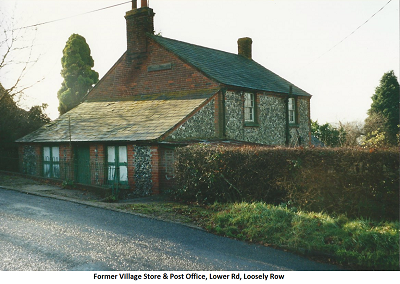
Arthur was born at Bryants Bottom in 1902, one of a large family which were farming at Lodge Hill Farm, Saunderton when Arthur married Emily Floyd in 1930, daughter of George and Annie Floyd. The latter owned Floyd's Stores at Loosley Row the family running a grocery and coal and carrying business. Arthur and Emily then lived there too.
When George died they changed the name of the shop to A.W.Harvey's and added 'The Post Office'. Emily died in 1952 and Arthur closed that part of the business and the Post Office moved to the top of Loosley Hill - the 3rd Post Office - Hill Croft Dairy with John Lawrence as Postmaster.
John Henry Edward Lawrence of Hill Croft Dairy, Loosley Hill was the 6th Postmaster. He was the son of Mary Ann (nee Adams) and Edward Lawrence, tavern manager, both of Ware, Herts. In 1929 he married Ethel Louisa Woodhouse at Ware. They came to Loosley Row about 1932.
John, known as 'Jack' was essentially a smallholder with a local milk round and a sizeable general store run by his wife. He had a small dairy herd on three & a half acres of home pasture and other rented fields off which he also made hay for winter feed. He took on the Post Office to add to his wife's shop. They had 3 children Basil J born 1930 & Jean M 1931 both born at Ware. Then Mary Elizabeth born 1940 at Loosley Row.
In 1952 he sold the milk round to Wren Davis Dairy of Prestwood, concentrating on poultry and 'Barley-Beef' calves.
Mary, daughter of Jack and Ethel, (always called Mrs Lawrence, except by Jack who used a nickname) grew up helping in the shop and Post Office after school hours then full time when they left.
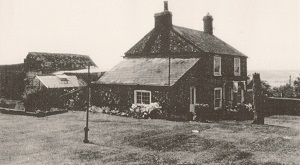
Mrs Lawrence died in 1963 and when Jean married in 1968 the shop was greatly reduced in size. By 1965 Mary was postmistress in all but name.
In 1970 Jack became ill for the first time in his life and was unable to sign official papers so Mary Lawrence was appointed Postmistress. Jack recovered and enjoyed semi-retirement keeping a large collection of exotic birds in a huge aviary which almost covered his garden. He died in April 1981
Mary Lawrence was appointed Postmistress in 1970 after her father Jack retired (the 7th Postmaster/mistress.) She had helped her mother in the Post Office and shop after school hours and full time when she left. She shared the milk and grocery delivery round with her father for 14 years then became postmistress in all but name for five years though her father continued to hold the office.
By 1970 when she officially took the position she had that quiet confidence and encyclopaedic knowledge of the Royal Mail her customers knew. She kept a well stocked counter with a great many every day requirements which may well have saved a journey into town. But what made the Post Office of vital importance in this rural area was the availability of stamps and postal orders, pensions, benefits and National Savings Bank business and National Giro Bank. Accounts could be payed - electricity, rates, water rates and telephone. TV licences, Savings stamps and certificates, even travellers cheques could be purchased.
In 1881 on the death of her father she notified the landlord and asked for the lease to be put into her name. She was sent Notice to Quit. Mr Nash of Hunt and Nash helped her and a deal was struck for Mary to buy the house and garden. The landlord to retain the land. Many sub-post offices were being closed and campaigns were launched to help Mary in her fight to save her business.
There had been several break-ins at night over the years but then one took place in the day at gunpoint. The Securicor cash had just been delivered. Protected behind her glass screen she saw the man couldn't fire through the slot at the bottom. A customer entered but having the gun turned on him ran off presumably to get help. Mary pressed her alarm. The burglar decided to leave empty handed.
A second daytime robber came wearing a balaclava and wielding a knife. He jumped over the counter to get to her. In doing so he knocked a lot of eggs onto the floor and slipped over. Again she pressed her alarm. He ran out to his waiting accomplices.
Mary had been presented with many awards by the Royal Mail for her standards, valour and service. but she decided to call it a day, it was 1997.
A large collection was raised to thank her for all she had been to her customers but Mary would have no ceremony. In poured the tributes and many presents. Here are a few memories:-
"One of Mary's qualities was punctuality. If the post van drivers arrived early to collect post and parcels she would make them wait until the correct time to make sure people could catch the post."
"She was like an unofficial citizen's advice bureau particularly helping with DHSS problems"
"If a pensioner didn't collect their pension on their day Mary would call after work to check they were OK"
"Mary never had a holiday in all those years so everyone will wish her a long and happy retirement"
"Mary would never pass on an unkind word about anyone, nor break a confidence."
"Lonely people would buy a few sweets just to have a chat"
"Mary was always ready to listen but never gossip"
"What she did beyond the call of duty was unprecedented."
Her house is now just known as Hill Croft. A post box still remains in the road ourside.
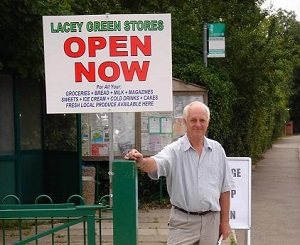
The Community Planning Group worked to get a sub-post office set up in Lacey Green Village Hall in 2003. It Opened on 11th October for 2 mornings a week on Monday and Thursday from 10am - 1pm. It was run as a satellite of Great Hampden by George Crombe who was the postmaster there.
It was joined by the community shop that opened in July 2009. George got on well with the shop volunteers and so opened on Tuesday morning as well as the two official ones. George retired in early 2013 and a new postmaster took over. It became a satellite of Naphill with Mr Singh as postmaster.
